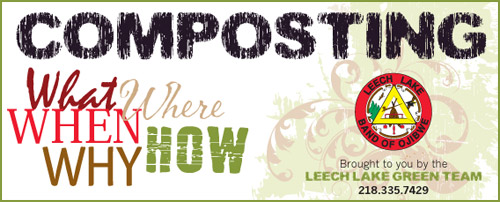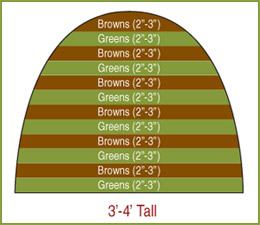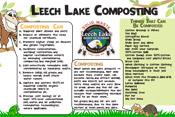
What is compost?
com•post/’kämpŌst/: decayed organic material used as a plant fertilizer.
Why should I compost?
Composting restores valuable nutrients to the ground. In essence, composting reduces or voids the need for man-made and chemical fertilizers and pecticides for a healthier garden.
Benefits of Composting
By composting and recycling, you can reduce the amount of garbage you generate by up to 80%! It quickly becomes routine and makes a big difference.
The added bonus is that the compost you generate will make your garden and lawn healthier, and less dependent on chemicals, fertilizers and watering.
How to Compost
 Compost needs 3 essential ingredients:
Compost needs 3 essential ingredients:
- Green material (weeds, vegetable trimmings, egg shells)
- brown material (leaves, wood chips, paper) and
- sufficient moisture
You want the pile to remain damp, but not dripping wet. Turn the pile about once a week by shoveling the outside towards the middle and continue moving until the fresh compost is now exposed. You will know that your compost pile is right if it becomes hot in the middle and it smells earthy. If your pile heats up, gets moisture, and gets turned regularly, you should have dark, wonderful compost in about one–two months time.
Building your Compost Pile
The recommended size for a home compost pile is no smaller than 3 feet x 3 feet x 3 feet, and no larger than 5 feet x 5 feet x 5 feet. A smaller pile may not heat up high enough for efficient breakdown, or it may loose heat and quickly slow down the
process. A larger pile may hold too much water not allowing air into the center.
Speed up the Composting Process
Composting is easy – it happens on its own. However, there are a few things you can do to speed up the composting process. Just Follow these steps:
Chop and tear – It helps to chop up larger items or tear up items like clothing, newspaper, cardboard, etc. before putting them in your compost pile for faster decomposition.
Stir – Mix the new material into the existing pile using a compost turner, pitchfork or other garden tool. This also adds oxygen, a key component to successful composting.
Cover your food waste with a handful of old leaves, other dried yard waste or soil. This will add carbon and reduce the chance of odors and fruit flies. Then put the lid back on and let it “cook”.
Finished Compost
Compost is complete when it is dark, crumbly, and has an earthy smell.
Avoid using unfinished compost, as organic acids may harm plant roots.
If compost is still hot, smells like ammonia or you can still identify much of the organic material it is not ready to use yet.
The volume of finished compost will have been reduced by 30-50 percent.
Did you Know
Did you know that grass clippings are a great source of nitrogen for your compost pile?
Usually you have more clippings than needed for composting so just leave the rest on your lawn!
Leaving the clippings returns nutrients to the soil.
- Shredded Paper/Newspaper
- Grass, Leaves & Yard Waste
- Bread/Pasta/Crackers
- Coffee Grounds/Filters
- Tea Leaves/Bags
- Coooked & Raw Fruits & Vegetables
- Wood Chips/Sawdust
- Dryer Lint
- Egg Shells
- Nuts
- Livestock Manure
- Paper Towels
- Fish Scraps
- & Much more!
- Disease or Insect Infested Plants
- Evergreen Needles, Poison Ivy and other Poisonous Plants
- Weeds that Contain Seeds
- Meat & Animal Products
- Fatty Foods/Dairy Products
- Oil/Grease/Fatty Foods
- Cat and Dog Manure
Oh No! Problem Solving
What if...The pile smells like rotten eggs?
- Not enough air, too much water
- Add brown material like dry leaves
- Pile should be damp like a wrung out sponge
- Turn more frequently
The pile smells like ammonia?
- Too much nitrogen (greens), not enough air
- Add dry leaves, sawdust or straw
- Turn more frequently
Printables
 |
 |
 |
Contact Us
| Name | Title | Phone |
|---|---|---|
| Matt Rogotzke | GreenCore | 335-7411 |















 Division of Resource Management
Division of Resource Management